At its core, a tax accountant is a financial expert specializing in meeting tax compliance and planning requirements. This role demands extensive knowledge of the tax code, allowing them to prepare, file, and manage tax statements and returns for both businesses and individuals. Tax accountants' responsibilities extend beyond mere calculation and filing. They analyze and implement strategies to minimize tax liabilities while adhering to tax laws. They stay updated with the latest changes in tax regulations, interpret tax laws, and provide guidance tailored to your financial goals and circumstances. Employing the expertise of a tax accountant offers numerous benefits. With their deep understanding of complex tax laws, they ensure accurate filing while helping you save money by identifying deductions and credits you may overlook. An experienced tax accountant saves you time, alleviates the stress associated with tax filing, and provides peace of mind knowing that your taxes are handled professionally. Moreover, in the event of an audit, your tax accountant can guide you through the process, making it less daunting. The tax code isn't linear—it grows more complex as your income increases. Higher earnings can push you into a different tax bracket, potentially triggering an alternative minimum tax. A tax accountant can help navigate these intricacies, optimizing tax strategies to minimize liabilities. Running a business, self-employment, or having side hustles significantly complicates your tax situation. Deductions, business expenses, home office deductions, and self-employment taxes—all add layers of complexity. A tax accountant can help you navigate these waters, ensuring compliance and optimizing your tax position. Investments bring tax implications—capital gains, dividends, interest income, and foreign tax issues, to name a few. If you possess significant investments, an accountant can provide advice on tax-efficient investing strategies, ensuring that you maximize after-tax returns. Effective tax planning is crucial to maximizing your retirement savings. Whether it's deciding between a traditional and a Roth IRA or managing pensions and Social Security benefits, a tax accountant can provide guidance to ensure your retirement savings grow tax-efficiently. Major life changes like marriage, divorce, or buying a house impact your tax situation. Each comes with new tax implications and potential traps. Engaging a tax accountant during these transitions ensures you understand the tax implications and plan accordingly. Income from foreign sources or living abroad adds complexity to your taxes. International tax laws, foreign earned income exclusions, and tax treaties—navigating these require specific expertise. A tax accountant with experience in international taxation can be invaluable in such situations. If you're planning significant charitable donations, it's crucial to understand their tax implications. Charitable contributions can provide substantial tax deductions, but rules can be complex. A tax accountant can guide you on how to structure these donations to optimize tax benefits. One misstep in the tax-filing process could lead to significant issues. Incorrectly filed returns might result in penalties and interest, while underpayment could lead to further scrutiny from the IRS. A tax accountant drastically reduces these risks with their expertise and meticulous attention to detail. Tax errors could lead to financial and legal repercussions. You could face an audit, penalties, or legal action in extreme cases. By having a tax accountant manage your filings, you minimize these risks and protect yourself from potentially costly mistakes. Overlooking deductions and credits is akin to leaving money on the table. Without an in-depth knowledge of the tax code, you might miss out on these tax-saving opportunities. A tax accountant is trained to spot these opportunities, potentially saving you significant sums in the long run. When choosing the right tax accountant, it's crucial to consider their educational background and professional qualifications. An accountant should ideally possess credentials such as a Certified Public Accountant (CPA) or an Enrolled Agent (EA) status. These accreditations guarantee that they've undergone rigorous training and are equipped with the necessary knowledge to handle diverse tax scenarios. Alongside qualifications, the accountant's practical experience in your industry should be of significant importance. An accountant with a proven track record in your business sector will understand the specific tax complexities and opportunities associated with it. Experience will also imply their capability to handle potential tax-related issues and provide optimized solutions. Transparency in the fee structure is a crucial factor when hiring a tax accountant. A good accountant will clearly explain their fee structure upfront to avoid surprises down the line. It's also essential to assess if their charges are reasonable by comparing them with the average market rates. This ensures you get value for your money without compromising the quality of the service. For those with simple tax situations, tax software could be a viable alternative. These programs guide you through the filing process, help identify potential deductions, and are typically more affordable than hiring a professional. For low-income taxpayers or elderly individuals, free tax clinics or community programs can be a valuable resource. These programs offer assistance in preparing and filing taxes and can help navigate basic tax situations. If your tax situation is uncomplicated—single, no dependents, standard employment, minimal investments—tax software or community programs may be adequate. However, as your financial life grows more complex, the value of a tax accountant tends to increase. Knowing when to hire a tax accountant is fundamental in navigating your financial life. The right decision can mean significant savings, reduced stress, and confidence in your compliance with tax laws. This is especially true as the tax code continues to evolve and grow in complexity. Your tax situation is unique and depends on several factors—your income sources, life changes, investment portfolio, and more. By understanding these factors, you can make an informed decision on whether hiring a tax accountant is beneficial. Consider your needs, weigh the costs and benefits, and decide what best fits your circumstances. Remember, investing in professional tax assistance can be a proactive step towards financial health and can potentially provide you with long-term financial benefits through accurate, strategic tax planning and minimization.Understanding What a Tax Accountant Does
Role and Responsibilities of a Tax Accountant
Advantages of Hiring a Professional Accountant for Taxes
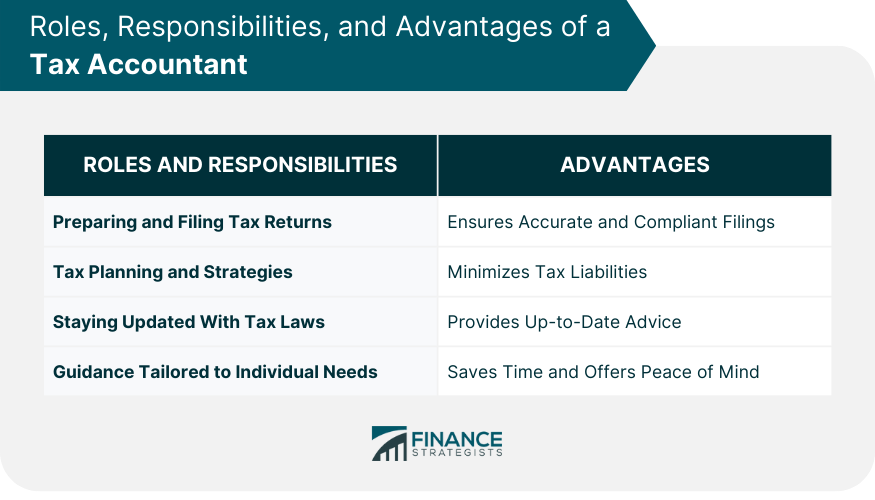
Identifying the Need for a Tax Accountant
Increase in Personal Income
Ownership of a Business, Self-Employment, or Additional Income
Possession of Large-Scale Investments
Preparation for Retirement: Tax and Savings Planning
Undergoing Major Life Changes
Receipt of Income From Abroad
Plans for Large-Scale Charitable Donations
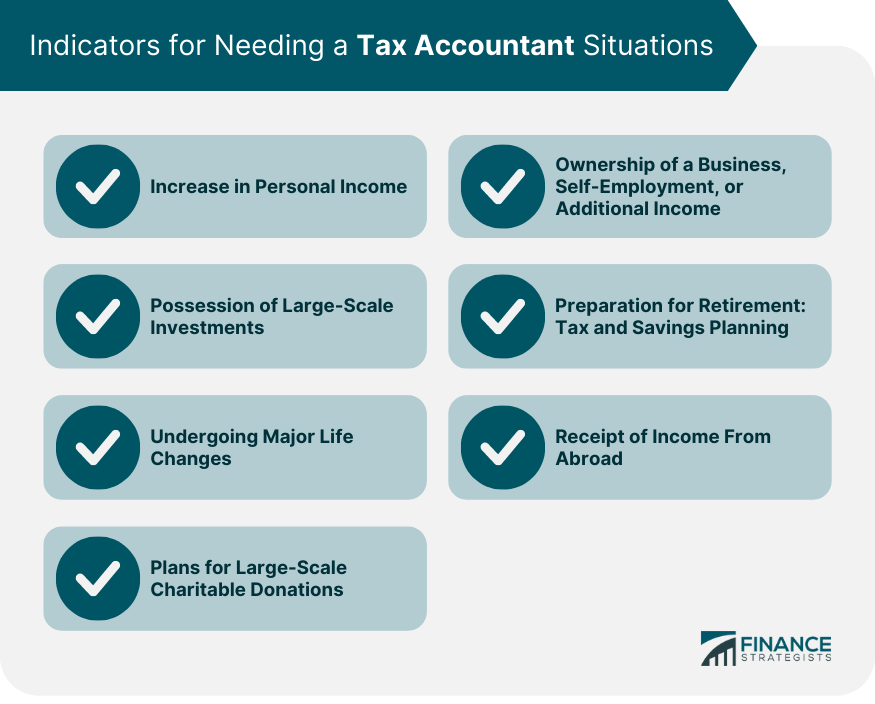
Consequences of Not Hiring a Tax Accountant When Needed
Possible Errors in Tax Filing
Potential Financial and Legal Consequences
Missed Opportunities for Tax Deductions and Credits
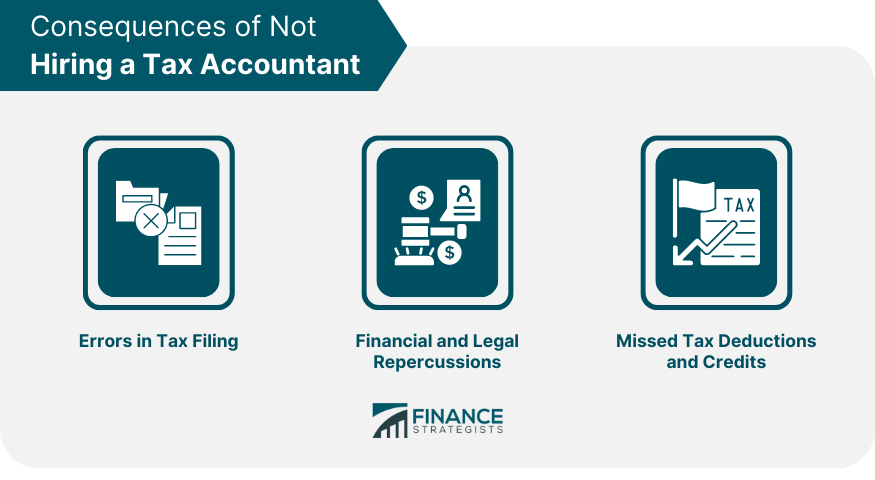
How to Find and Choose the Right Tax Accountant
Appropriate Qualifications
Relevant Experience
Clear and Reasonable Fee Structure
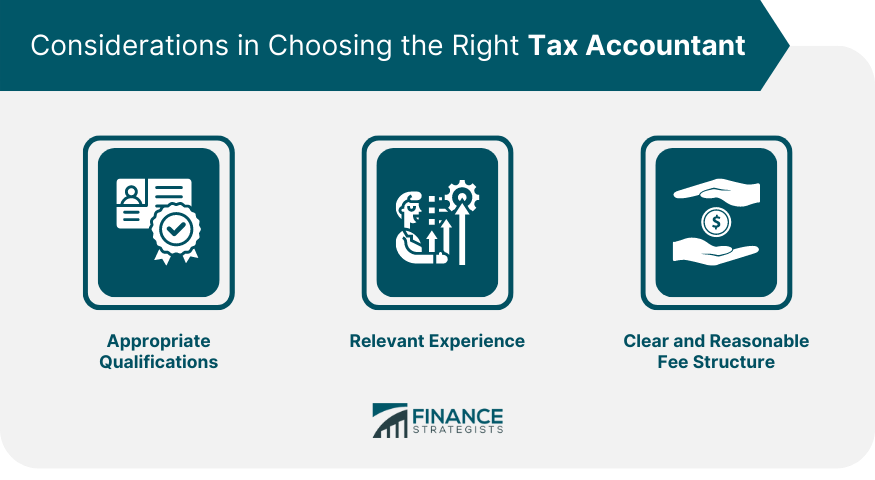
Alternatives to Hiring a Tax Accountant
Utilizing Tax Software
Enlisting the Help of Tax Clinics or Community Programs
When These Alternatives Might Be Sufficient
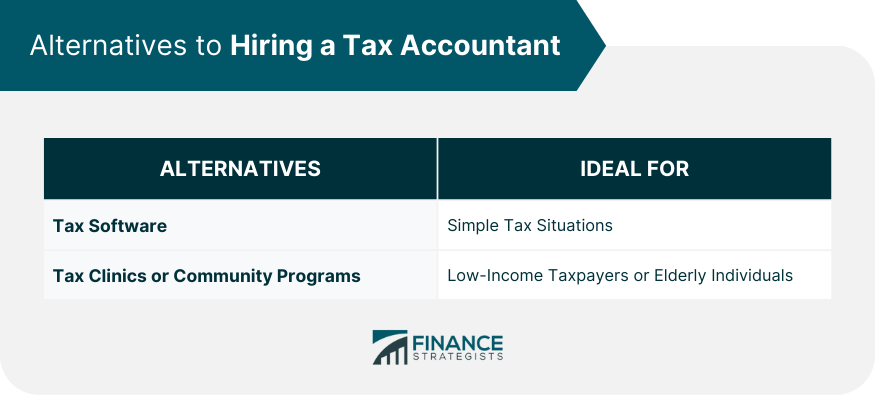
Bottom Line
When Should You Hire a Tax Accountant? FAQs
You should consider hiring a tax accountant if you have a rise in personal income, own a business, are self-employed, have large-scale investments, are preparing for retirement, are experiencing major life changes, have income from abroad, or plan on making large-scale charitable donations.
A tax accountant prepares, files, and manages tax statements and returns for both businesses and individuals. They also provide strategies to minimize tax liabilities while adhering to tax laws.
A tax accountant ensures accurate filing, identifies potential deductions and credits, saves you time, and provides peace of mind knowing your taxes are being handled professionally.
If not hiring a tax accountant when needed, you risk making errors in tax filing, which could lead to financial and legal consequences. Additionally, you may miss opportunities for tax deductions and credits.
Yes, alternatives to hiring a tax accountant include utilizing tax software or enlisting the help of tax clinics or community programs, particularly if your tax situation is uncomplicated.
True Tamplin is a published author, public speaker, CEO of UpDigital, and founder of Finance Strategists.
True is a Certified Educator in Personal Finance (CEPF®), author of The Handy Financial Ratios Guide, a member of the Society for Advancing Business Editing and Writing, contributes to his financial education site, Finance Strategists, and has spoken to various financial communities such as the CFA Institute, as well as university students like his Alma mater, Biola University, where he received a bachelor of science in business and data analytics.
To learn more about True, visit his personal website or view his author profiles on Amazon, Nasdaq and Forbes.















